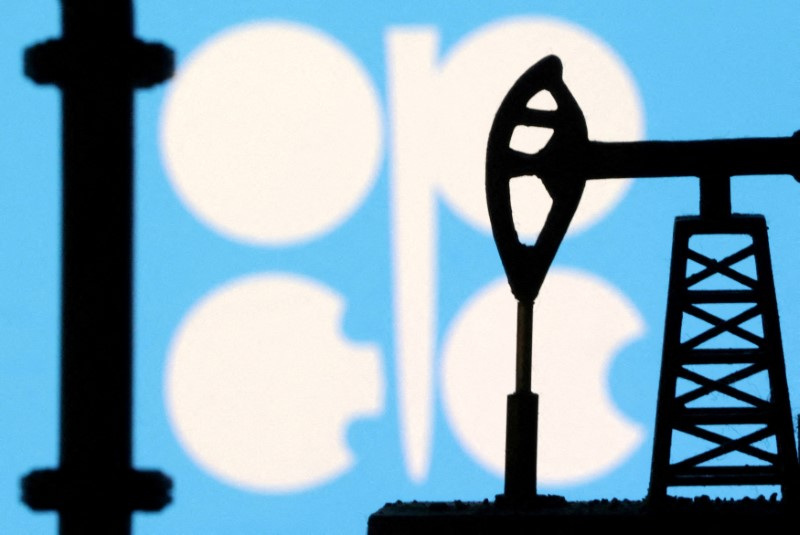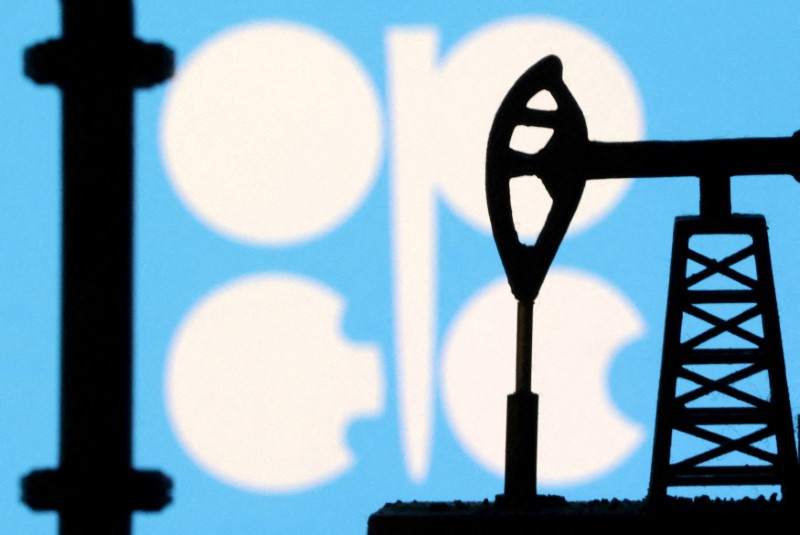Commodities
What is OPEC+ and how does it affect oil prices?

DUBAI (Reuters) – The Organization of the Petroleum Exporting Countries (OPEC) and allies including Russia are known collectively as OPEC+ and will meet on June 2 to discuss their joint oil production policy.
Below are key facts about OPEC+ and its role.
WHAT ARE OPEC AND OPEC+?
OPEC was founded in 1960 in Baghdad by Iraq, Iran, Kuwait, Saudi Arabia and Venezuela with an aim of coordinating petroleum policies and securing fair and stable prices. Now it includes 12 countries, mainly from the Middle East and Africa, accounting for about 30% of the world’s oil.
There have been some challenges to OPEC’s influence over the years, often resulting in internal divisions. More recently, the global push towards cleaner energy sources and a move away from fossil fuels could ultimately diminish its dominance.
OPEC formed the so-called OPEC+ coalition with 10 of the world’s leading non-OPEC oil exporters, including Russia, at the end of 2016.
OPEC+ crude output represents about 41% of global oil production. The group’s main objective is to regulate the supply of oil to the global market. The leaders are Saudi Arabia and Russia, which produce and 9 million and 9.3 million barrels per day (bpd) of oil respectively.
Angola, which joined OPEC in 2007, quit the bloc at the start of this year, citing disagreements over production levels. Ecuador quit OPEC in 2020 and Qatar in 2019.
HOW DOES OPEC INFLUENCE GLOBAL OIL PRICES?
OPEC says its member states’ exports account for about 49% of global crude exports. OPEC estimates that its member countries hold about 80% of the world’s proven oil reserves.
Because of its large market share, the decisions OPEC makes can affect global oil prices. Its members meet regularly to decide how much oil to sell on global markets.
As a result, when they lower supply in response to falling demand, oil prices tend to rise. Prices tend to fall when the group decides to supply more oil to the market.
The OPEC+ group is currently cutting output by 5.86 million bpd, equal to about 5.7% of global demand.
The cuts include 3.66 million bpd by OPEC+ members to the end of 2024. A further 2.2 million bpd of voluntary cuts by some members expire at the end of June.
The June 2 meeting could decide to extend voluntary cuts by several months, sources have told Reuters.
The voluntary cuts are led by Saudi Arabia with a cut of 1 million bpd.
Despite deep production cuts prices are trading near their lowest this year at $81 a barrel, down from a peak of $91 in April, pressured by elevated stocks and concerns over global demand growth. [O/R]
HOW DO OPEC DECISIONS AFFECT THE GLOBAL ECONOMY?
Some of the producer group’s supply cuts have had significant effects on the global economy.
During the 1973 Arab-Israeli War, Arab members of OPEC imposed an embargo against the United States in retaliation for its decision to re-supply the Israeli military, as well as other countries that supported Israel. The embargo banned petroleum exports to those nations and introduced cuts in oil production.
The oil embargo pressured an already strained U.S. economy that had grown dependent on imported oil. Oil prices jumped, causing high fuel costs for consumers and fuel shortages in the United States. The embargo also brought the United States and other countries to the brink of a global recession.
In 2020, during COVID-19 lockdowns around the world, prices slumped. After that development, OPEC+ reduced oil production by 10 million barrels a day, which is equivalent to about 10% of global production, to try to bolster prices.
Gasoline prices are an important political subject in the United States, where a presidential election takes place this year, and have prompted Washington to make repeated calls on OPEC+ to release more oil.
OPEC says its job is to regulate supply and demand rather than prices. The group’s members depend heavily on oil revenue, with Saudi Arabia’s budget balancing at an oil price of between $90 and $100 a barrel, according to various estimates.
CAPACITY DILEMMA
Besides production cuts, OPEC+ is set to debate its members’ production capacity figures this year – a historically contentious issue.
The group has tasked three independent companies – IHS, WoodMac and Rystad – to assess production capacity of all OPEC+ members by the end of June.
Capacity estimates help OPEC+ to establish baseline production figures from which cuts are made.
Member countries tend to fight for higher capacity estimates to gain a higher baseline and end up with higher production quotas after cuts are applied, and hence ultimately higher revenues.
The need for new quotas comes as members such as the United Arab Emirates and Iraq expand production capacity while the biggest OPEC producer, Saudi Arabia, has scaled back additions to its output potential.
OPEC+ member Russia has effectively had its production capacity reduced by the war in Ukraine and Western sanctions.
WHICH COUNTRIES ARE OPEC MEMBERS?
The current members of OPEC are: Saudi Arabia, United Arab Emirates, Kuwait, Iraq, Iran, Algeria, Libya, Nigeria, Congo, Equatorial Guinea, Gabon and Venezuela.

Non-OPEC countries in the global alliance of OPEC+ are represented by Russia, Azerbaijan, Kazakhstan, Bahrain, Brunei, Malaysia, Mexico, Oman, South Sudan and Sudan.
Sources: Reuters News, World Economic Forum website, OPEC website, U.S. Department of State website
Commodities
Oil prices rise; U.S. crude inventories plunge, Russia-Ukraine truce eyed
Commodities
India’s Reliance to stop buying Venezuelan oil over US tariffs, sources say
Commodities
Oil prices climb on Venezuela supply worries

 Forex4 years ago
Forex4 years agoForex Today: the dollar is gaining strength amid gloomy sentiment at the start of the Fed’s week

 Forex3 years ago
Forex3 years agoUnbiased review of Pocket Option broker

 Forex3 years ago
Forex3 years agoDollar to pound sterling exchange rate today: Pound plummeted to its lowest since 1985

 Forex3 years ago
Forex3 years agoHow is the Australian dollar doing today?

 Cryptocurrency3 years ago
Cryptocurrency3 years agoWhat happened in the crypto market – current events today

 World3 years ago
World3 years agoWhy are modern video games an art form?

 Commodities3 years ago
Commodities3 years agoCopper continues to fall in price on expectations of lower demand in China

 Economy3 years ago
Economy3 years agoCrude oil tankers double in price due to EU anti-Russian sanctions























